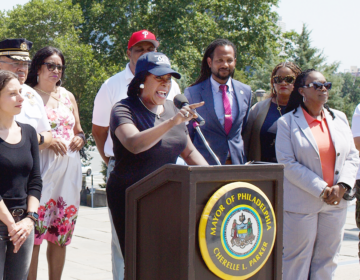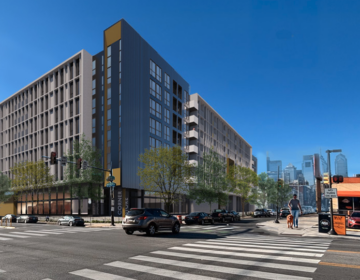Philly’s new property tax assessments: How to challenge your new valuation
The average residential assessment is rising by 31% and a large number of challenges are expected. Plus, here are some programs to offset the burden.

The Philadelphia skyline is seen along the banks of the Delaware River, Wednesday, Oct. 18, 2017. (Matt Rourke/AP Photo)
After pausing reassessments for three years, Philadelphia officials on Monday released new property valuations. They can be accessed on the city’s website, which also provides previous assessment values.
The new figures, which dictate individual property taxes, are expected to send an additional $92 million in property tax revenue to the city’s General Fund. But they’re also expected to be the basis for thousands of appeals, in addition to proposals from lawmakers to offset the increases, which average 31% for residential properties compared to the last reassessment in 2019. (The city says there is no “meaningful way” to calculate how many people will appeal.)
Appealing your assessment
Property owners who want to dispute their reassessment have two options, neither of which are mutually exclusive or require an attorney.
Residents can informally appeal their new property value by requesting that the Office of Property Assessment conduct what’s known as a “First Level Review.”
For FLR reviews, people must be able to prove one of the following, according to the city’s website:
- The estimated market value of your home is too high or too low.
- The estimated market value of your property is accurate, but inequitable.
- The characteristics of your property that affect its value are substantially incorrect. This includes a missing or incorrect abatement or exemption.
The form to get assessors to take a second look will be included in a forthcoming mailing from the city that will notify property owners of their new assessments. Officials said the mailing should arrive by Sept. 1, but could be delayed because the city’s vendor is struggling to procure enough envelopes due to supply chain issues.
Property owners can also file a formal appeal of their assessment with the city’s Board of Revision of Taxes. The deadline, set by the state, is the first Monday in October, which this year is Oct. 3.
Neither option is particularly fast.
“They do take some time, particularly in years like this one when there’s an expectation that a significant number of people are going to file appeals,” said Jonathan Sgro, a supervising attorney with the Homeownership and Consumer Rights Unit at Community Legal Services.
Limiting the impact of your assessment
Alternatively, the city has existing programs designed to offset property reassessments.
With the city’s homestead exemption, most homeowners can get the assessed value of their property reduced by $45,000. For many, that translates to more than $600 a year in savings on their real estate tax bill. And once the city approves the application, homeowners never need to reapply for the exemption, as long as they continue to own and live on the property.
Owners who have a 10-year residential abatement are not eligible for the homestead exemption.
Mayor Jim Kenney wants to increase the tax break for owner-occupied homes to $65,000.
Under the city’s Longtime Owner Occupants Program, certain homeowners can have their property value locked in for as long as they remain eligible. The program is geared toward residents living in rapidly gentrifying neighborhoods.
Kenney has proposed raising the program’s total cap from $25 million to $30 million
To qualify, applicants must:
- Be a homeowner whose primarily residence’s assessment increased by 50%
- Have lived in their home for at least 10 years.
- Be current with their property taxes, or a participant in an “owner occupied payment agreement” or installment plan.
- Have an income that falls below the program’s limits. For a family of four, the income cap is $158,100.
If the city approves an application, the homeowner’s reassessment value is capped at 150% of the previous year’s value. For example, if a home was assessed at $100,000 in 2022, the property value in 2023 could not exceed $150,000.
“One of the primary benefits of this program is not only that … it mitigates the impacts of a dramatic impact this year, but it would also protect them against additional increases in the future,” said Sgro.
The deadline to apply is Feb. 17, 2023.
A similar program freezes real estate taxes for certain older homeowners, even if their property assessment or the tax rate changes.
Under The Low-income Senior Citizen Real Estate Tax Freeze, eligible applicants must either be:
- 65 or older.
- Live in the same household with a spouse who is 65 or older.
- Be a widow of someone who was at least 65 before he or she died.
Applicants must also meet the following income requirements:
- Make $33,500 or less for a single person.
- Make $41,500 or less for a married couple.
The initial deadline to apply for the program is Sept. 13, 2022. The final deadline is typically Jan. 31, 2023.
 WHYY is one of over 20 news organizations producing Broke in Philly, a collaborative reporting project on solutions to poverty and the city’s push towards economic justice. Follow us at @BrokeInPhilly.
WHYY is one of over 20 news organizations producing Broke in Philly, a collaborative reporting project on solutions to poverty and the city’s push towards economic justice. Follow us at @BrokeInPhilly. 
Subscribe to PlanPhilly
WHYY is your source for fact-based, in-depth journalism and information. As a nonprofit organization, we rely on financial support from readers like you. Please give today.









